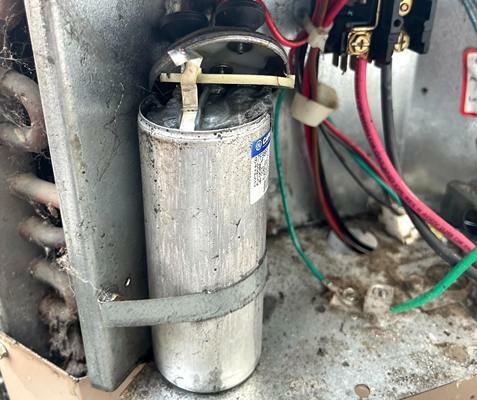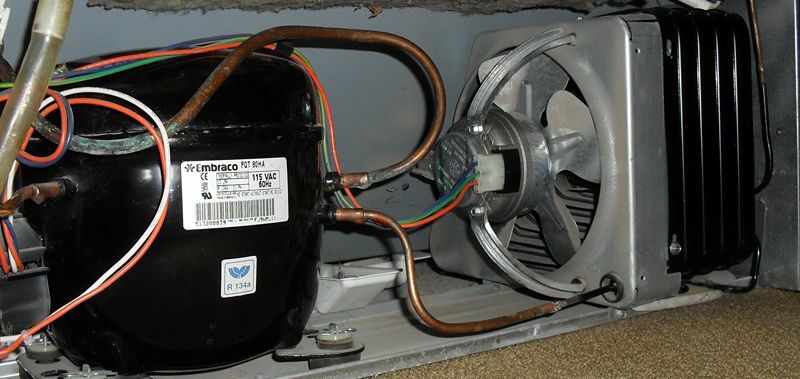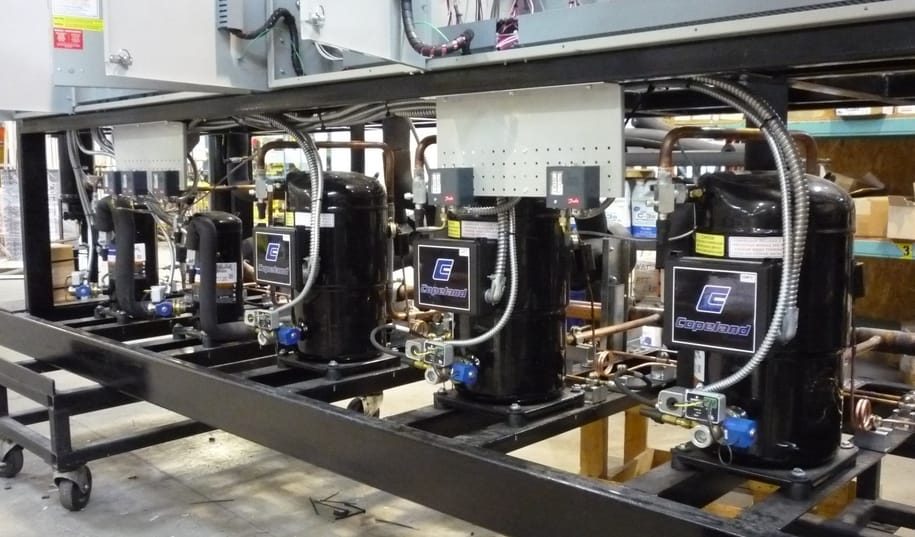Last Updated on November 6, 2022
Coming home from work, turning your air conditioner ON, and sitting in that cool stream of air is so relaxing.
But what if no cool air is coming out of your AC? Not because its fan is not running, but because you discovered that its compressor didn’t kick on. It starts only after waiting several minutes after turning your AC ON.
What if the same happens if you accidentally turn OFF your Window, Split or Central AC and turn it back ON, or switch modes from fan to AC? Why does your compressor start so late?
An unusually late start of an AC compressor is usually due to a faulty capacitor that is providing insufficient current for the compressor to start. However, many manufacturers keep a little delay intentionally to prevent damage by voltage fluctuations. Other reasons include a malfunctioning thermostat or problems with electrical wiring.
Personally, I have encountered both of these scenarios with my AC (recently with my Split). Many people have faced similar problems with Central and Window ACs too.
This is when I started looking into this matter deeply, researched it thoroughly, resolved this issue with my AC, and finally decided to write a detailed article about it.
In this article, I plan to share possible causes for delay in your AC compressor starting, their diagnosis, and solutions. I will also share what worked for me personally. I hope this is helpful to you.
1. Your AC Capacitor has Deteriorated

If your AC does have a problem, that is delaying the compressor to start up, the first thing I would look for is the health of the capacitor.
But where does the capacitor fit in all of this?
Actually, the compressor motor as well as the fan motor need a lot of energy to start up. This is too much to be provided by your home’s power supply.
A capacitor stores electric charge and gives an initial jolt to jump-start both of these components when you turn ON your AC. Most of this energy is used by the compressor motor.
If your AC has a faulty capacitor, its compressor will not get enough start-up energy when you turn it ON. Consequently, compressor will have a hard time starting up. This might cause it to start late start.
Is there more than one capacitor in your AC? What is the rating of these capacitors? How do you know which capacitor is faulty?
Capacitor Rating depends on the cooling capacity, type i.e., Window, Split, Central AC, etc., and the manufacturer of your AC system.
Moreover, there are two types of capacitors based on working: Running and Starting.
Running capacitor allows smooth and consistent operation of the compressor and fan motor.
Starting capacitor provides that initial boost to the compressor and fan motor to start.
Generally, the running capacitor is always less in rating than the starting capacitor. Also, as the cooling capacity (Btus or tonnage) of AC increases, so does the required capacity of capacitors.
Depending on this, they can range from 5 microfarads up to 80 microfarads.
What happens if you don’t replace your malfunctioning capacitor soon?
It is crucial that you replace your faulty capacitor at the earliest.
A defective capacitor will cause your AC to consume relatively much higher power which will prominently show on your electric bill.
Secondly, a bad capacitor can also cause the compressor to hard start. This is when a compressor has a hard time overcoming the pressure difference inside it, due to the lack of that initial jolt given by the capacitor on AC start.
An immense amount of energy is required during this process. This in turn will generate intense heat and strain in the compressor. Eventually, it will burn out, or at least its life will reduce significantly.
Diagnosis and Solutions
- Turn your AC ON and select a temperature sufficiently lower than the ambient temperature.
- Then listen closely if your compressor started. Notice any additional sounds from it at the beginning that are unusual. A stuttering or clicking sound might be an indication of your AC compressor hard starting.
- Turn AC OFF and back ON, with some time in between, to be sure the compressor is actually starting late.
- After you are sure about the late start, my advice is to first look at the manual. Check if this delay is intentional by the manufacturer. There are other ways to know that. I have discussed those in the next section.
If this delay is not intentional, or a lot longer than indicated by the manufacturer, use the following steps to diagnose and resolve the capacitor problem:
- Cut the power to the AC unit and open the case. In the case of separate outdoor and indoor units, open the case of the outdoor unit. Only do so if you are comfortable though. If you are, you can use the following methods to inspect your AC capacitor:
- Visual Inspection: A bulged or deformed physical shape of the capacitor is usually an indication of its bad health.
- Electrical Inspection: Checking resistance and voltage by a multimeter is the proper way to be sure about the health and liveliness of a capacitor. Only continue this inspection, if you have experience. Don’t worry if you don’t get this. Normally a deformed capacitor is a good enough indicator of its bad health.
- Wherever you stop your diagnosis, share it with a certified technician and let the technician continue from there.
- Make sure to replace the capacitor with one that has the same specifications as prescribed by the manufacturer.
Some Useful Notes
There are other reasons, besides a bad capacitor, for the compressor to delay turning ON due to hard starting.
In some scenarios, the capacitor is good enough to provide the required energy, but compressor components have aged or worn out.
This is when you will need something called a hard start kit. Don’t worry if it sounds complicated, it’s not. I will cover it in detail for you in this section.
2. Delay Is Intentional to Protect the Compressor
Many times, your AC compressor starts late after it is turned ON because it is programmed to do so by the manufacturer.
This is done to protect the compressor from voltage fluctuations. This deliberate late compressor start will also prevent sudden load on your home’s power supply.
By the way, this was the reason for the delayed start of the compressor in my air conditioning system. The mistake I made was immediately suspect that the components attached to the compressor, or the compressor itself, were at fault.
Diagnosis and Solutions
- The best way to diagnose this to be the reason for the late compressor start is by contacting support. Just ask them if this was preprogrammed. You would save a lot of time and suspicion.
- You could also look for this information in the AC manual.
- Or you could simply google the manufacturer and model of your AC unit with this query. Usually, if other people suspected this issue, they would have succinct FAQs explaining probable causes.
3. You Have a Malfunctioning Thermostat
In any type of air conditioning system, a thermostat is a device that is responsible for regulating temperature in the required environment i.e., your living space.
During the time your AC is running, when the selected temperature is sensed by the thermostat, it switches OFF your AC to save power.
When this happens, either only compressor turns OFF, or both the compressor and fan do so.
In my AC, I have an auto function for the fan. If I select it, when the desired temperature is achieved, both the AC compressor and fan will turn OFF. If I don’t, only the compressor turns OFF.
A faulty thermostat can give you many indications. It may result in your AC never turning ON, or turning OFF at the wrong temperature.
However, in case of a malfunctioning thermostat, there is also a possibility that it does not signal your AC to turn ON right away when you command it to, due to problems with electronic components, temperature sensor, or circuitry.
So it might be that your AC compressor starts late due to problems with its thermostat.
Diagnosis and Solutions
How to know for sure that your AC thermostat is the reason for late or no compressor start?
In the case of Central Air Conditioning, it is very handy to diagnose the thermostat.
- If you have a generic idea of electrical conduction, all you have to do is take OFF your thermostat until you see the bare wires. Connect the wires appropriately to bypass the thermostat.
- Basically, by doing this, you are manually controlling power to your AC. If fan and compressor do turn ON instantly, this is an indication that the delay was actually due to the thermostat. I am attaching a video below that covers much more visual details and information about which wires you specifically need to short in order to test your thermostat.
- If the AC compressor kicks ON, now you know the thermostat was the cause for it not starting. This is when you should check power to AC through thermostat and try it a couple of more times to check if compressor delay persists.
- Otherwise, you could replace it. I actually selected one for you. Here, have a look. It is smart, reliable, elegant and could be controlled remotely from anywhere via Alexa. By the way, it also has a variation with C-wire adapter, in case your home is missing a common wire.
Be careful though, if you do not know what you are doing, just call the guy and let him check your AC thermostat for you.
In the case of a Window or Split AC, the diagnosis is the same:
- You have to connect corresponding wires to bypass the thermostat to check if the compressor kicks ON.
- If the thermostat is faulty, you can replace it with the same model. The only problem is that with these types of AC systems, you will have to open the case to do that.
- That is why I recommend that with in-case thermostats you call a certified technician, particularly the one recommended by the manufacturer, to diagnose and replace them.
4. Faulty Compressor Components or Motor
All mechanical components deteriorate with time. The same is the case with your AC compressor. Sometimes it delays start-up because of malfunctioning or deteriorated components inside it.
Normally, with no electrical problems or deprivation, or any external physical impact, it is unusual for a compressor to fail all of a sudden. If that is the case, and the compressor still has an unusually long delay in turning ON, then this is probably due to its aging.
With time, your AC compressor becomes less and less efficient. This means it takes more and more energy than required. It comes to the point where even with the specified capacitor it is unable to start up properly.

Diagnosis and Solutions
In this situation, either the compressor never starts up, or it hard starts, which means high energy and possibly a late start.
In case it does hard starts, clicking and stuttering noise are usual indicators for it. You will also see a spike in your energy bills due to a declining compressor.
The solution is simply installing a hard start kit. It consists of a capacitor and relay, that provide enough energy at the beginning for the compression to initiate easily.
A hard-start kit will prevent damage to compressor components, and also save you money on energy by allowing your compressor to operate smoothly.
Despite the fact that a hard-start kit will save you a lot of money on energy, it will have no effect on the energy wasted by an inefficient AC compressor. Thereby, if your AC is too old, it might not be a bad idea to invest in a new one than spend money on an old one trying to make it more efficient.
5. Less Freon Makes You Feel Like Compressor Didn’t Start
If I may ask, how did you check that your AC compressor didn’t start?
If you did so by waiting for the air to become cool while standing in front of your AC vents, there is a possibility your compressor may be running just fine. It just might be that your AC is low on refrigerant.
Actually, a sufficient amount of refrigerant is required in AC lines, for them to cool properly. This is because if freon is less than that, it will not go through the necessary liquid-vapor phase changes required for the air conditioning cycle.
The quantity of refrigerant in your AC system is supposed to stay the same irrespective of the hours of operation. It is not a maintenance process. This means if there is a reduction in overall pressure in refrigeration lines it is due to leakage anywhere in the lines.
Some Indicators for Leaking Refrigerant
These are some of the common signs that indicate refrigerant leak(s) in air conditioners:
- Hissing sounds from the AC unit or bubbling if leakage is high (from the indoor unit if you have central or split with separate indoor and outdoor units)
- AC has unusually long cooling cycles. Meaning it does not turn off despite running for a very long time.
- Your AC does not reduce humidity effectively to reduce the ability of evaporator coils to take the heat.
- If you observe and compare for longer times your electric bills are increasing notably.
- Evaporator coils freeze after some time you turn your AC ON. (This could also be due to dirty coils so clean them beforehand any actions)
- There is an unusual smell of fumes when you turn your AC ON. It is unhealthy for you too.
Diagnosis and Solutions
Observe your compressor when you turn ON your AC. Notice if compressor ever clicks ON.
Of course, in the case of split or central AC, you will have to observe this close to outdoors. If you hear compressors starting or running this means it is not the problem.
Even if you don’t observe any sound, before making any judgment, look for indicators for leaking refrigerant first. If you find any or multiple of them, maybe all you have is a leak somewhere in the lines.
In that case, leak(s) will have to be fixed and the freon will need to be repressurized in the system. Call a certified technician to do that for you. Give all of this information to him beforehand to save yourself time.
By the way, I have covered detecting leaks and recharging AC in this article. If you are interested, you are welcome to read it.


